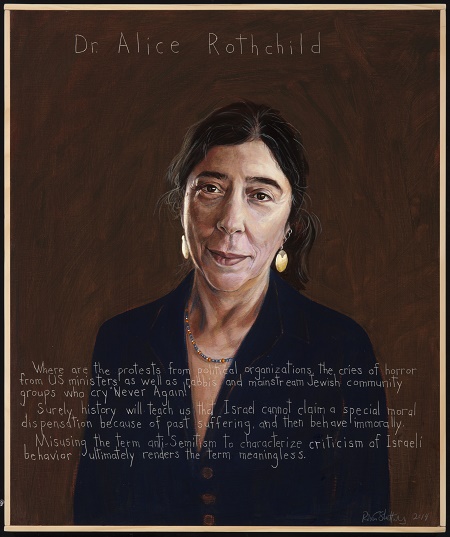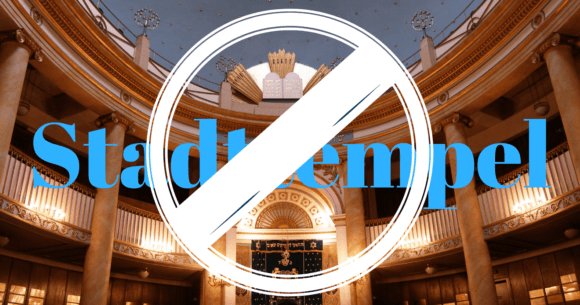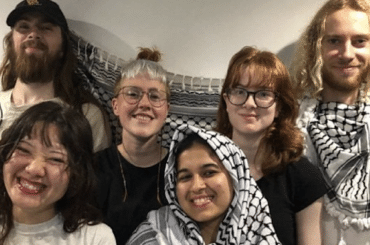The email was concerning; it arrived in my personal inbox and that of Just World Books. And in the emails to Robert Shetterly (who painted my portrait as part of his Americans Who Tell the Truth project), and to an activist in the Boston area who had organized a presentation for me. The author stated he was, “the only Jewish criminal attorney at law in Vienna and member of the Executive board of Austria’s oldest, main and central synagogue, the famous Vienna “‘Stadttempel.'” He described the local Jewish community as small but wealthy and flourishing. He ended the first paragraph with: “But as the only child of Holocaust survivors I do not forget our history.”
The attorney expressed concern that my books and “the far left“ Jewish Voice for Peace, of which I am a member, are advocating for the boycott of Israel and that, “Boycott is a form of violence.” He noted that since January 2018 BDS supporters have been banned from entering Israel.

He reminded me that, “the Holocaust began with the boycott of Jewish shops, Jewish lawyers, Jewish doctors and Jewish institutions. Boycott of Jews was the beginning of the worst mass murder in history, the Shoah,” and that much of his family did not survive, “At that time your government refused to issue visas for Jews from Europe. You should remember this anti-Jewish policy of your homeland, of the United States of America during the Second World War.”
He ended with, “So please tell Dr. Rothchild and her friends not to come to our synagogue. These people are not welcome here. We do not want to see them, we do not want to hear them, we do not want to pray together with them. They can stay wherever they want, but please let them stay away from us.”
My first thoughts were how does an old Jewish attorney in Vienna find me typing away in my study somewhere in the Pacific Northwest? What Israel hasbara organization and/or perhaps Israeli military intelligence unit now has me in their radar? Will they send out their troops to disrupt the next time I am giving a presentation? The shunning, on the other hand, was all too familiar.
Besides being angry, this man is also in great pain; the horrors of the Nazi Holocaust wiped out much of his family and shaped his life and world view. I imagine there must be some kind of personal vindication to live in Vienna and rebuild a Jewish community in the belly of the beast. I have tremendous respect and empathy for that kind of suffering and strength and for what is required to survive and prosper. I also share his outrage at the immigration policies of the U.S. as well as other nations that refused or turned away Jews desperately fleeing certain death and disaster. I know from this attorney‘s further correspondence with Mr. Shetterly that he views the Palestinians as the new Nazis. This is a common feeling among many Jews, often expressed in Israel as, “When I see Arafat, I see Hitler,” and in the frequent use of the words “potential holocaust” to describe any perceived external threat to the state.
These ideas are a compounded tragedy and I would argue a grave misunderstanding. First, boycotts are a well respected, nonviolent form of protest that has been used for good, (Quakers against slave holders, African-Americans in Montgomery refusing to take the bus), and evil (Nazis against Jews). The strategy of boycott is not evil or inhumane in itself, but it can be used for a variety of purposes. The Nazis used “boycott“ not to protest for an oppressed minority or against some injustice, but as a governmental policy to discriminate and destroy another people. The boycott, divestment, and sanction of Israel was called in 2005 by over 150 Palestinian civil society activists seeking to end the second class citizenship of Palestinians in Israel, to end the occupation, and to resolve the multigenerational refugee catastrophe – without violence.
To equate Palestinians with Nazis, the attorney used the oft quoted example of Amin al-Husseini, the Grand Mufti of Jerusalem from 1921 to 1948. Al-Husseini is a complex, controversial figure, an Arab nationalist who actively opposed Zionism in the 1920s and also became an opponent of British colonialism in Palestine. During WW II he collaborated with fascist Italy and Nazi Germany, but after 1948 he was sidelined by the Palestine Liberation Organization. It is unclear how much of his political activities were grounded in Arab nationalism and anti-colonialism, and how much in anti-Semitism. The Arab nationalism and anti-colonialism are understandable responses to the British Empire and Jewish settlement in Palestine; the anti-Semitism is unforgivable.
That said, it is important to remember that there never was a Nazi party in historic Palestine and that Islam does not have the centuries old history of Jew hatred that is found in European Christianity. The call to boycott, divest, and sanction Israel also has an explicit statement against bigotry of all types and names anti-Semitism in particular. The anti-Semitism and anti-Zionism that can now be found in Muslim countries began almost entirely with the founding of the State of Israel and resentment in the Arab speaking world regarding the Israeli treatment of the indigenous Palestinian population. It is also a politically useful issue for autocratic leaders seeking to unite their restive citizens who have a lot of other political and economic matters to complain about. The Palestinians I have worked with in the region make a clear distinction between Jews (fellow Abrahamic religious people) and Zionists (people with the clear intent to dispossess Palestinians of their land and to erase their history and rights). This is an important difference.
The second big problem for me is that my accuser does not make a distinction between Jews (a people, a cultural group, an ethnicity, a religious community) and Israel (a country that claims to be a state of the Jewish people, that privileges Jews over non-Jews, but is none-the-less still a country). That is a critical distinction and I would argue that it is particularly the responsibility of Jewish people to call out the egregious policies of the State of Israel when the state claims to be speaking for us. It is a state not a religion after all. The recent passage of the Nation State Bill has also made it abundantly clear (as if it had not been already), that it is not possible to be a democracy (a state of equal citizens) and a Jewish state (a state that privileges the national aspirations, history, trauma and dreams of Jews only, despite its multicultural society). And if we are tax paying U.S. citizens, we have an added complicity given the billions of dollars of military aid as well as political cover that our government provides for the Israeli state and its war machine.
I fail to understand how a a brutal occupation of the West Bank and East Jerusalem and a crushing siege of Gaza keeps Israel safe. How arresting thousands of children, jailing tens of thousands of young people, restricting permits to travel to hospitals for treatment or travel abroad for study brings us closer to peace. How an aggressive Jewish settlement project in East Jerusalem and the West Bank is supposed to make Palestinians more willing to negotiate. How discriminating against 21 percent of Israeli citizens can be compatible with democracy. How refusing to take responsibility for the ongoing refugee crisis builds anything but another generation of angry, impatient, disillusioned young people and the hostility of surrounding nations.
Though I am not a religious person, (that ended a long time ago), and I actually have no plans to attend the synagogue in Vienna, or any synagogue for that matter, I do take the moral foundations, the prophetic traditions, of my Jewish heritage very seriously. When I see oppression and injustice and inhumanity, I am compelled to call it out and I will advocate whatever nonviolent means of resistance I have at my disposal. Ironically, my voice is often welcomed in churches and mosques. I hope someday to be welcomed in synagogues too. It would be nice to come home.



It’s unfortunate that “the only Jewish criminal attorney at law in Vienna and member of the Executive board of Austria’s oldest, main and central synagogue” has chosen…
– not to advocate for the universal and consistent application of justice, accountability and equality; but, instead,
– anti-Semitically to conflate Israel and Zionism with all Jews and all Jews with Israel and Zionism; and
– hypocritically to advocate for a right for Jews to do unto others acts of injustice and immorality they would not have others do unto them.
Peace and continued respect to Ms. Rothchild.
Alice Rothchild’s open response to “the only Jewish criminal attorney at law in Vienna” is as understanding, as kind, as informative, and rational as any Zionist could ask for.
The Zionist attorney is highly selective in the history he cites. His selections may reflect his view of the Jewish religion. The connection between Jewish religious teachings and Israeli actions and policies is discussed by Israeli Professor Israel Shahak in his book Jewish History, Jewish Religion. It is available online here.
https://ifamericaknew.org/cur_sit/shahak.html
“At that time your government refused to issue visas for Jews from Europe. You should remember this anti-Jewish policy of your homeland, of the United States of America during the Second World War.”
I was under the impression that the US was refusing visas for everyone, not just Jews. But, of course, it is only Jews who matter.
“I imagine there must be some kind of personal vindication to live in Vienna and rebuild a Jewish community in the belly of the beast.”
I don’t see the point of rebuilding a Jewish community “in the belly of the beast”, though I do see a point to living in Vienna.
Anti-Semitism is the view that originated in Germany in the 19th century that Jews are a racial group of non-European origin, and as such, don’t deserve the same rights as “real” white people. It doesn’t make sense to suggest that a Palestinian Arab might even have such a view. Of course a Palestinan Arab might well hate all Jews, but not for this reason. Now if you’re using “anti-Semitism” as a catchall term for all anti-Jewish hostility, how can you call one form of it “understandable” and another form of it “unforgivable”? A lot of people who lived in Europe during WW2 are anti-German as a result of that experience, but who’s going to wag a finger at them and say that although anti-German sentiment is an understandable response to German invasion and genocide, anti-German sentiment that comes from anti-Teutonism is unforgivable?
How could there have been? Unlike, say, a Communist party, a precondition for the existence of a National Socialist party would be an already established state that could exert military power. Palestine was governed as a colony, and correct me if I’m wrong, but no colony anywhere had a Nazi party.
My understanding is that Jew-hatred such as it has been in the Islamic world is all about religious difference, never about racial difference. If you were a member of the Ummah, it didn’t matter if you had Jewish ancestry.
There also was an anti-Nazi boycott since 1933: https://en.wikipedia.org/wiki/Anti-Nazi_boycott_of_1933
Guess who broke it? Zionists in Palestine ….